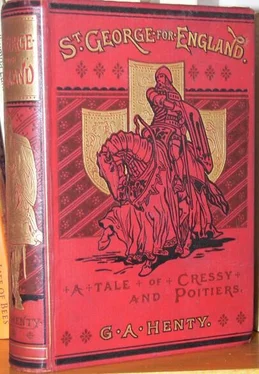G. Henty - St. George for England - A Tale of Cressy and Poitiers
Здесь есть возможность читать онлайн «G. Henty - St. George for England - A Tale of Cressy and Poitiers» весь текст электронной книги совершенно бесплатно (целиком полную версию без сокращений). В некоторых случаях можно слушать аудио, скачать через торрент в формате fb2 и присутствует краткое содержание. Жанр: Старинная литература, на английском языке. Описание произведения, (предисловие) а так же отзывы посетителей доступны на портале библиотеки ЛибКат.
- Название:St. George for England: A Tale of Cressy and Poitiers
- Автор:
- Жанр:
- Год:неизвестен
- ISBN:нет данных
- Рейтинг книги:3 / 5. Голосов: 1
-
Избранное:Добавить в избранное
- Отзывы:
-
Ваша оценка:
- 60
- 1
- 2
- 3
- 4
- 5
St. George for England: A Tale of Cressy and Poitiers: краткое содержание, описание и аннотация
Предлагаем к чтению аннотацию, описание, краткое содержание или предисловие (зависит от того, что написал сам автор книги «St. George for England: A Tale of Cressy and Poitiers»). Если вы не нашли необходимую информацию о книге — напишите в комментариях, мы постараемся отыскать её.
St. George for England: A Tale of Cressy and Poitiers — читать онлайн бесплатно полную книгу (весь текст) целиком
Ниже представлен текст книги, разбитый по страницам. Система сохранения места последней прочитанной страницы, позволяет с удобством читать онлайн бесплатно книгу «St. George for England: A Tale of Cressy and Poitiers», без необходимости каждый раз заново искать на чём Вы остановились. Поставьте закладку, и сможете в любой момент перейти на страницу, на которой закончили чтение.
Интервал:
Закладка:
Then arose the terrible insurrection known as the Jacquerie. For centuries the peasantry of France had suffered under a bondage to which there had never been any approach in England. Their lives and liberties were wholly at the mercy of their feudal lords. Hitherto no attempt at resistance had been possible; but the tremendous defeat of the French at Poitiers by a handful of English aroused the hope among the serfs that the moment for vengeance had come. The movement began among a handful of peasants in the neighborhood of St. Leu and Claremont. These declared that they would put to death all the gentlemen in the land. The cry spread through the country. The serfs, armed with pikes, poured out from every village, and a number of the lower classes from the towns joined them. Their first success was an attack upon a small castle. They burned down the gates and slew the knight to whom it belonged, with his wife and children of all ages. Their numbers rapidly increased. Castle after castle was taken and stormed, palaces and houses leveled to the ground; fire, plunder, and massacre swept through the fairest provinces of France. The peasants vied with each other in inventing deaths of fiendish cruelty and outrage upon every man, woman, and child of the better classes who fell into their hands.
Owing to the number of nobles who had fallen at Cressy and Poitiers, and of those still captives in England, very many of their wives and daughters remained unprotected, and these were the especial victims of the fiendish malignity of the peasantry. Separated in many bands, the insurgents marched through the Beauvoisis, Soissonois, and Vermandois; and as they approached, a number of unprotected ladies of the highest families in France fled to Meaux, where they remained under the guard of the young Duke of Orleans and a handful of men-at-arms.
After the conclusion of the peace at Bordeaux, Sir Walter Somers had been dispatched on a mission to some of the German princes, with whom the king was in close relations. The business was not of an onerous nature, but Walter had been detained for some time over it. He spent a pleasant time in Germany, where, as an emissary of the king and one of the victors of Poitiers, the young English knight was made much of. When he set out on his return he joined the Captal de Buch, who, ever thirsting for adventure, had on the conclusion of the truce gone to serve in a campaign in Germany; with him was the French Count de Foix, who had been also serving throughout the campaign.
On entering France from the Rhine the three knights were shocked at the misery and ruin which met their eyes on all sides. Every castle and house throughout the country, of a class superior to those of the peasants, was destroyed, and tales of the most horrible outrages and murders met their ears.
"I regret," the Count de Foix said earnestly, "that I have been away warring in Germany, for it is clear that every true knight is wanted at home to crush down these human wolves."
"Methinks," the captal rejoined, "that France will do well to invite the chivalry of all other countries to assemble and aid to put down this horrible insurrection."
"Ay," the count said bitterly; "but who is to speak in the name of France? The dauphin is powerless, and the virtual government is in the hands of Marcel and other ambitious traitors who hail the doings of the Jacquerie with delight, for these mad peasants are doing their work of destroying the knights and nobles."
The villages through which they passed were deserted save by women, and in the small towns the people of the lower class scowled threateningly at the three knights; but they with their following of forty men-at-arms, of whom five were followers of Walter, fifteen of the captal, and twenty of the Count de Foix, ventured not to proceed beyond evil glances.
"I would," De Foix said, "that these dogs would but lift a hand against us. By St. Stephen, we would teach them a rough lesson!"
His companions were of the same mind, for all were excited to fury by the terrible tales which they heard. All these stories were new to them, for although rumors had reached Germany of the outbreak of a peasant insurrection in France, the movement had but just begun when they started. As far as the frontier they had traveled leisurely, but they had hastened their pace more and more as they learned how sore was the strait of the nobles and gentry of the country, and how grievously every good sword was needed. When they reached Chalons they heard much fuller particulars than had before reached them, and learned that the Duchess of Normandy, the Duchess of Orleans, and near three hundred ladies had sought refuge in Meaux, and that they were there guarded but by a handful of men-at-arms under the Duke of Orleans, while great bands of serfs were pouring in from all parts of the country round to massacre them.
Meaux is eighty miles from Chalons, but the three knights determined to press onward with all speed in hopes of averting the catastrophe. Allowing their horses an hour or two to rest, they rode forward, and pressing on without halt or delay, save such as was absolutely needed by the horses, they arrived at Meaux late the following night, and found to their delight that the insurgents, although swarming in immense numbers round the town, had not yet attacked it.
The arrival of the three knights and their followers was greeted with joy by the ladies. They, with their guard, had taken up their position in the market-house and market-place, which were separated from the rest of the town by the river Marne, which flows through the city. A consultation was at once held, and it being found that the Duke of Orleans had but twenty men-at-arms with him, it was determined that it was impossible to defend the city walls, but that upon the following morning they would endeavor to cut their way with the ladies through the peasant hosts. In the night, however, an uproar was heard in the city. The burghers had risen and had opened the gates to the peasants, who now poured in in thousands. Every hour increased their numbers.
The market-place was besieged in the morning, and an hour or two afterward a large body of the ruffians of Paris, under the command of a brutal grocer named Pierre Gille, arrived to swell their ranks.
The attack on the market-house continued, and the Duke of Orleans held a consultation with the three knights. It was agreed that against such a host of enemies the market-place could not long be defended, and that their best hope lay in sallying out and falling upon the assailants. Accordingly the men-at-arms were drawn up in order, with the banners of the Duke of Orleans and the Count de Foix and the pennons of the captal and Sir Walter Somers displayed, the gates were opened, and with leveled lances the little party rode out. Hitherto nothing had been heard save yells of anticipated triumph and fierce imprecations and threats against the defenders from the immense multitude without; but the appearance of the orderly ranks of the knights and men-at-arms as they issued through the gate struck a silence of fear through the mass.
Without an instant's delay the knights and men-at-arms, with leveled lances, charged into the multitude. A few attempted to fight, but more strove to fly, as the nobles and their followers, throwing away their lances, fell upon them with sword and battle-ax. Jammed up in the narrow streets of a small walled town, overthrowing and impeding each other in their efforts to escape, trampled down by the heavy horses of the men-at-arms, and hewn down by their swords and battle-axes, the insurgents fell in vast numbers. Multitudes succeeded in escaping through the gates into the fields; but here they were followed by the knights and their retainers, who continued charging among them and slaying till utter weariness compelled them to cease from the pursuit and return to Meaux. Not less than seven thousand of the insurgents had been slain by the four knights and fifty men, for ten had been left behind to guard the gates of the market-place.
Читать дальшеИнтервал:
Закладка:
Похожие книги на «St. George for England: A Tale of Cressy and Poitiers»
Представляем Вашему вниманию похожие книги на «St. George for England: A Tale of Cressy and Poitiers» списком для выбора. Мы отобрали схожую по названию и смыслу литературу в надежде предоставить читателям больше вариантов отыскать новые, интересные, ещё непрочитанные произведения.
Обсуждение, отзывы о книге «St. George for England: A Tale of Cressy and Poitiers» и просто собственные мнения читателей. Оставьте ваши комментарии, напишите, что Вы думаете о произведении, его смысле или главных героях. Укажите что конкретно понравилось, а что нет, и почему Вы так считаете.












